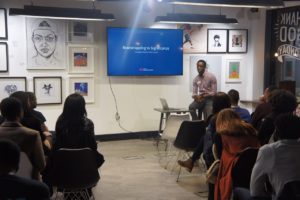Introduction
Nnamdi is no stranger to the Nigerian tech scene. From the heady days of leading Parkway Projects, to a few other startups/projects in between, to now being the founder of Nigeria Property Centre (NPC). It’s clear Nnamdi has earned his ‘been there & done that’ t-shirt. So I was lucky to hear him speak at a BTNG event here in London and I found him to be concise, candid, and no BS artist. In other words, my kind of person!
As the evening progressed, I became super intrigued to speak to Nnamdi again as he made a few interesting observations (more of that to come) at Camden. Like a magician, he told a room of people to bring out their phones and search for any rental property in Nigeria and chances are NPC will be right on top (it’s true — you can check yourself). And without prompting, quite a few members of the audience corroborated using his service during the Q&A session of his talk.
I wanted to know more about him, NPC, and the Nigerian Startup scene from his viewpoint. Below is a condensed version of our conversation. Enjoy.
Papa: Who is Nnamdi Chineme?
Nnamdi: I like to think of myself as a 50% techy and 50% businessman. I started writing software back in university, Federal University of Technology, Owerri and during youth service; I decided to have a go at my first startup. My dad is a doctor who happens to have been running a hospital at the time. I felt it will be cool to automate my dad’s daily processes, you know, streamline things like patient bookings, drug inventories, prescription orders, staff management, etc. So I built a solution to automate all of that.
I genuinely felt I did a decent job with the final output and tried to sell it to a few big hospitals in the city of Port Harcourt. I had my first taste of failure — and what turned out to be a long lasting life lesson on startups: it’s not all about the technology.
In this case, making hospital management easier wasn’t about software. The hospitals didn’t have internet access, computers, reliable power, understaffed, etc. which meant that providing them with new software was irrelevant to making lives better.
Much later, I moved down to Lagos, where I and four other co-founders founded Parkway Projects. Thirteen long years later, the firm still exists. With Parkway Projects, we embarked on a lot of exciting projects. We were the first business to launch a website where people could recharge (top-up) their phones online. We also started, in partnership with Interswitch, to deliver ATM monitoring solution. We also worked with EcoBank for the collection of payments to mention a few of the projects we successfully provided.
Papa: You’ve run startups in the past. What’s the one thing you agree with right now, that the old you wouldn’t agree with?
Nnamdi: The old me was quite ambitious in every way. I was quite willing to take risks without necessarily considering all worst case scenarios. The ‘considering all scenarios’ aspect, is part of the lesson I took from my failed startup.
Currently regarding startups, I understand that it’s wise to consider taking calculated risks. You should be especially conscious of the parts of any proposed activity that you have some degree of control over or not.
Take, for instance, a startup called CGN Systems which I co-founded when I got to the U.K. With CGN; we were trying to improve the learning process in universities via an e-reader. This period was the same time when Amazon’s Kindle first came out. What we had in mind with CGN was to have all the learning material that students need, delivered via e-readers. The plan was to eliminate paper course materials, submission of coursework, etc. and provide an enhanced learning experience including notifications about different going ons on campus, announcements of future events, etc.
However, we didn’t have control over a lot of things. We were not manufacturers, yet we didn’t have good connections to the hardware suppliers. We needed a reliable connection into the universities, yet we didn’t have useful links to their IT departments. The IT departments were our primary customers to enable adoption with students. In summary, a lot of things that would determine our success was outside our control.
The difference now is that the ‘old me’ will continue slugging away, whereas the ‘new me’ can recognise the time to move on.
NPC is an excellent example of how I’ve taken all those lessons. I’ve got a lot of control. For instance, as I’ve mentioned earlier, I’m a developer so I can lock myself up and just build software with the full knowledge that it makes a difference to my end goal. Same with marketing, I can personally do a lot to reach the end customers.
Papa: Talking of Nigeria Property Center, I heard you speak at BTNG where you talked about bootstrapping your company, and I know you run a pretty lean operation and you, of course, live in the U.K. What’s your advice for other entrepreneurs based in the U.K about building for Nigeria?
Nnamdi: NPC is in the technology space which is the most straightforward type of business you can run remotely. You can have staff working from anywhere. On the other hand, if I were buying and selling, it would require people on the ground for day-to-day operations.
Concerning a tech startup, I think the critical thing is to understand the resources at your disposal and the key metrics that drive the performance of your business.
For instance, I started NPC without spending a lot of money. And we’ve relied mainly on organic growth till date. I have of course spent a lot of my time which I’ve not quantified, but as I mentioned earlier, it’s all about working with things within my control. Also, because I know I’ve not got unlimited resources, I’ve got to keep my eyes on what’s essential for the business.
Just as, in the early days, I spent a lot of time working on the SEO strategy. Making sure it was right, making sure we were on the first Google page for search results. Because I think that’s crucial to any internet business.
The ability to focus on what’s important is always understated. To give an example, I listen to Nigeria radio a lot. Every morning, I get up and surf the stations which is just my little way of knowing what’s going on and to have a sense of the market as well. In any case, there was a period where I heard a lot of OLX ads and other competitors’ ads on the radio. And I had this intense FOMO of what I thought was a good marketing strategy. I figured if they were advertising so much it must have been working. I decided to give radio ads a shot as well.
Luckily, I had a friend who was able to make a radio jingle for free. I ran the advert for a week, I spent N500,000, and I got absolutely zero value for it. I looked at our traffic profile and saw no increase in site visits. We didn’t convert new customers from the huge expense we incurred. In fact, all our key metrics stayed flat.
One could argue that perhaps the ad wasn’t the right one, or the radio slot wasn’t good enough, etc. but even at that, it’s right to think we should have seen at least a slight increase in site visits, but instead, we got zilch. For me, this just goes to prove that because everyone is doing something doesn’t mean it’s adding value. It’s worth mentioning that this experience is in relation to the industry NPC operates in and may be different for businesses that operate in other sectors.
Papa: Startups regularly claim to be the largest or biggest in Nigeria. The property space is not immune to this bragging thing. But you’ve got some pretty decent stats to back up your talk. Does that affect you or how you position yourself?
Nnamdi: It’s an interesting one and as you’ve said; everyone says they’re number one even though they started yesterday.
Truthfully, the core metric that determines the no.1 company in any market is a closely guarded secret. Sometimes, what passes for the core metric is subjective. In my industry, the number of inquiries generated for agents (daily or monthly) or how many properties seekers have found, are good examples of metrics to use to determine the no.1 company in the Nigerian property market. As these stats are not published publicly, a proxy for determining the leader in the industry is the number of property listings on the website and number of site visits.
I will say based on the number of listings for property that is still available (some companies do not quickly remove unavailable property), NPC is arguably the number one site. From a traffic perspective, if you use third-party tools like Similarweb to compare traffic figures, we are ahead of all our competitors.
Either way you look at it, when we say ‘we’re the no.1 Nigerian real estate and property website’ we can indeed back our claim.
Papa: That’s interesting, and I must say as an unbiased outsider it appears to me that you’re doing as well or even better than your well-funded competitors. Are you afraid that in the long-run they might outspend you and win?
Nnamdi: This is one of the questions that keep me awake at night. Currently, I’m not afraid. The reality is that our competitors have always outspent us, but we’ve still executed better than them. Hence, I’m sure money is not the sole determinant factor of providing a better service or product.
A lot of times, I can see where they’re spending their money and where it goes to waste. As for us, we’re not just sitting back and being lax that we’re doing better. We’re still spending ourselves, albeit in a smaller and wiser way. If you look at our marketing outlay, it’s a significant portion of spend.
We’re an ambitious bunch and aim for significant year-on-year growth. Our growth is not as high as we want it to be but that’s probably more to do with the crash of the Nigerian economy in 2016 than to do with our competitors.
Papa: let me just ask you directly — if you have an opportunity for investment — would you take it?
Nnamdi: Considering that we’ve previously sought VC funding, this is a million dollar question for me at the moment. As we all know, investment is an opportunity to grow quicker. However, when I look at what our funded competitors are doing, we feel that they don’t move the needle to the degree that is expected considering the amount spent. Yes, with the extra cash they’re able to take more bets and experiments which is good, but I guess risky.
On our part, we have been more resourceful and mostly make data-driven decisions. We’re very heavily dependent on data. Most of the things we do on our website; moving a link, changing a button or choosing which areas to channel our marketing spend are all based on data we gather. We track everything and keep on crunching that data to see trends.
We feel that the market is growing at its own pace and some of our competitors are trying to force the market to grow faster. Just throwing money at the market is not the answer at this stage. The way I see the Nigerian market, the journey of businesses that provide services online is a pretty long game.
Papa: Let’s talk about the growth potential for Nigerian startups; one of the key things everyone harps about is the size of the market. Now I saw your tweet not too long ago where you commented on the NCC figures. What’s your view of the market?
Nnamdi: As I tweeted, I think the market is a lot smaller than people think it is. NCC reports that there are 91 million internet users in Nigeria. However, the potential target audience on Facebook across Nigeria is 18 million. Now I’m not saying Facebook is the perfect proxy for determining the exact number of people in Nigeria that use online services, but it does get me thinking to see that it is less than 20% of the figure quoted by NCC. Nigeria is indeed a big country, but I think the number of people that are using online services in the country is quite small. It will take a while for people to gravitate.
Some of our competitors are stimulating the market. Visiting potential users, showing people how to use the internet and their service, etc.They are all commendable acts and benefit everyone. However, it’s going to be a gradual process to get a sizable number of people doing more than just using WhatsApp. It’s a long game.
Papa: Let’s talk legacy. In what way would you want to have a long-lasting impact?
Nnamdi: I believe in giving back. One of the core reasons, I came to speak at BTNG is giving back. I’ve been six years in NPC, and anyway I can share my experiences and knowledge is of interest to me.



















